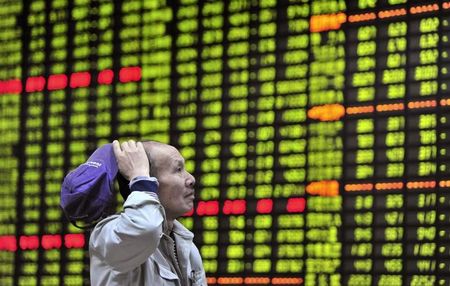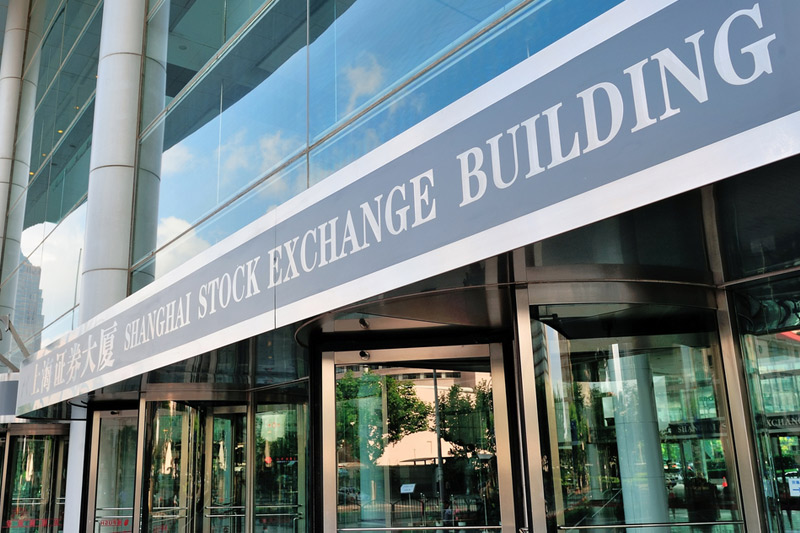By Kazunori Takada and Saikat Chatterjee SHANGHAI/HONG KONG (Reuters) - International buyers snapped up Chinese stocks on Monday at the debut of an exchange link that allows Hong Kong and Shanghai investors to trade shares on each other's bourses, a major step towards opening China's tightly controlled capital markets.
The so-called Stock Connect scheme gives foreign and Chinese retail investors unprecedented access to the two exchanges, which some analysts said could eventually lead to the creation of the world's third largest stock exchange.
Shares in both Shanghai and Hong Kong opened around 1 percent higher but quickly gave up some gains, with Hong Kong markets falling into negative territory.
The volume of "northbound" trade - investors with Hong Kong accounts buying mainland shares - was far greater than trade from mainland investors in the opposite direction, with the daily buying quota for Shanghai stocks exhausted by mid-afternoon.
Investors were cautious of chasing up shares given the strong market rally in the lead up to the launch on expectations of an increase in fund flows from the scheme, said Zheng Weigang, senior trader at Shanghai Securities.
"In the longer run, however, the connect will surely benefit both markets as China increasingly opens up to the outside world," Zheng added. "Particularly, the connect will help push the mainland's rampant speculative stock culture towards a more investment-oriented market."
As of 0645 GMT, the CSI300 index of top Chinese shares was down 0.3 percent while the Shanghai Composite Index was flat. The Hang Seng Index in Hong Kong was down 0.9 percent.
Analysts had expected much of the initial cash flow to be northbound, with foreign investors on the Hong Kong Exchange able to collectively buy up to a daily quota of 13 billion yuan ($2.12 billion) (1.35 billion pound) of mainland stocks.
The expected fund inflow had helped push the SSE180 Index and the SSE380 Index - the two main Chinese destinations for foreign investment through the scheme - up more than 10 percent and 6.5 percent since late last month.
Southbound investment, capped by a daily quota of 10.5 billion yuan, is likely to be less active.
By mid-afternoon, all the 13 billion yuan daily northbound quota had been used, meaning no further buy orders would be accepted for the remainder of the day. Less than 15 percent of the 10.5 billion yuan southbound quota had been taken up.
"It took a longer-than-expected period of time for such a small daily quota to be used, indicating overall sentiment in Shanghai remains cautious," said Zhang Gang, senior analyst at Central Securities in Shanghai.
Turnover in both markets were roughly in line with daily numbers.
LONG-TERM IMPACT
Over the longer term, however, the stock connect could boost the average daily value of stock trading in Hong Kong by about 38 percent by 2015, French bank BNP Paribas estimates, and may ultimately lead to the creation of the world's third largest stock exchange.
"Chinese investors will take Hong Kong as a place to put their long-term bets. So that's why I think in the long-run Hong Kong will benefit from this," said Alex Wong, asset management director at Ample Finance Group in Hong Kong.
For Shanghai, it is significant because it will allow foreign investors to get more actively involved in China's capital market, he added.
China already operates several cross-border investment schemes, but these are restricted to specific firms that must apply for a licence to participate.
The launch of the stock link scheme comes as Beijing steps up its financial market liberalisation efforts this year. It has established offshore yuan centres from Sydney to London, signed swap lines with countries in the Middle East and has allowed foreign companies in China to move renminbi across borders with greater freedom than ever before.
However, it also comes as a time when concerns over the world's second biggest economy are mounting. Highlighting such worries, Chinese banks' bad loan ratio rose to 1.16 percent at the end of September, up 0.09 percent points from June, the banking regulator said on Saturday.
The Stock Connect programme was originally expected to launch on Oct. 27, but that unofficial deadline passed, leading to speculation that the programme might be held up by technical or political hurdles.
The differing tax rules applying in Hong Kong and the mainland were also a major stumbling block, but China's Finance Ministry said on Friday that it would temporarily exempt taxes on profits made from the Connect scheme.

Hong Kong's leader CY Leung has hinted that the ongoing pro-democracy protests in the city had also played a role in the delay.
(Additional reporting by Lu Jianxin in SHANGHAI, Yimou Lee in HONG KONG and Shanghai newsroom; Editing by Will Waterman and Alex Richardson)
